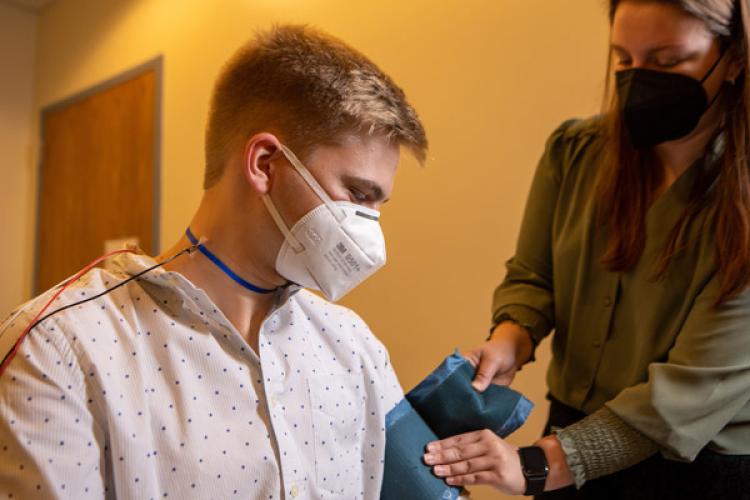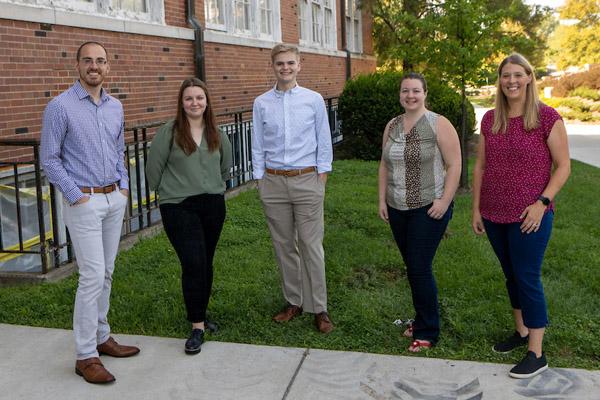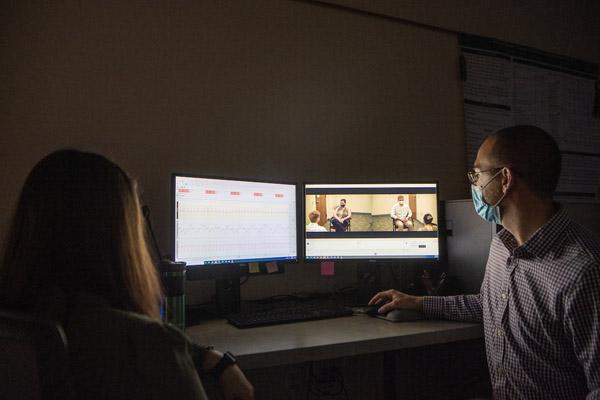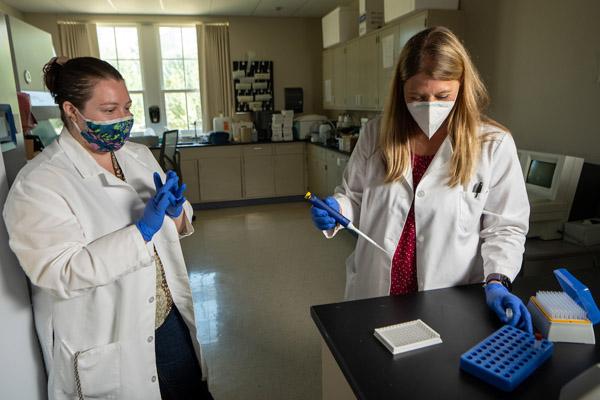
Brett Peters and Peggy Zoccola to look at how friends influence social anxiety

Social anxiety is a common and debilitating condition suffered by as many as 13 percent of adults, but many individuals don't benefit from current treatments.
In order to help develop better treatment options, a team of Ohio University psychologists is taking a basic science approach, thanks to a $453,000 grant from the National Institute of Mental Health, to examine how one-on-one interpersonal interactions among friends may be directly impacting social anxiety.
A key aspect of the project is that researchers don't just ask how someone feels, they also measure it.
Principal investigators Brett Peters and Peggy Zoccola will put their laboratories to use on the grant, "Examining emotion regulation processes in social anxiety from an interpersonal and observational perspective," for the next several years.
"A barrier to understanding and treating social anxiety is the lack of research on the processes that occur within interpersonal interactions that can shape social anxiety. One question we have is how do friends interact with each other to regulate their own and each other’s social anxiety," Peters, assistant professor of Psychology in the College of Arts & Sciences, said.

Lack of Research Means Lack of Treatments
"Do friends spend an inordinate amount of time talking about their anxiety problems, something researchers call co-rumination? Do they avoid talking about their anxiety, or suppressing it? Or do they reframe the problem so help reduce negative emotions, a process psychologists call reappraisal? All these processes can be predictive indicators of social anxiety, both in the lab and daily life," Zoccola, associate professor of psychology in the College of Arts & Sciences, said.
Peters and Zoccola share two experimental laboratories—the Laboratory for Biological Specimens and a Psychophysiology Training Laboratory—adjacent to their own research laboratories in Porter Hall. Their lab equipment includes medical equipment and software that allows the researchers to gather data on blood pressure, electrocardiography, and respiration.
Peters’ lab is also equipped with a Noldus Information Technology Observation suite, with two high definition cameras and microphones mounted in the participant rooms to video record person-to-person interactions. Zoccola's lab is set up for storage and processing of saliva specimens for various biomarkers.

Hands-on Experience for Psychology Students
These labs in Porter Hall are also where approximately 25 undergraduate students and several graduate students per semester will be involved in this project. Undergraduate students will sign up for course credit to participate in the lab.
"The hands-on research experience and training in scientific presentation afforded by this project will help prepare our undergraduate students to pursue advanced degrees in basic or clinical research," Zoccola noted.
Abriana Gresham, who is pursuing an Experimental Psychology Ph.D., has been immersed in research in Peters' lab and is the graduate student project coordinator, responsible for recruiting participants, helping to train and supervise undergraduate research assistants, collecting and managing data, and handling regulatory documents and reporting.
"Dr. Peters and Dr. Zoccola are incredible mentors and PIs," Gresham said. "During my time here at OHIO and working in Dr. Peters' lab, I've been able to work on several lab studies that use dyadic methods and cardiovascular physiology and a longitudinal study that used online methods and remote collection of biomarker data. Dr. Peters and Dr. Zoccola have been very supportive of me pursuing my own area of research, focused on the physiological and health-related consequences of interpersonal power, dominance, and violence, and I've been awarded an Original Work Grant, a Graduate Student Research Fund Award, and a Student Enhancement Award to do so."
Gresham also added that she has also been awarded travel awards to present her work at the American Psychosomatic Society, the American Psychological Association, the Society for Personality and Social Psychology, and the International Association for Relationships Research conferences.
"My work with Dr. Peters and our collaborators has been published in Psychophysiology and the Journal of Social and Personal Relationships," Gresham said. "All of this together has allowed me to build skills in carrying out research projects and disseminating findings that I hope will lead to a research-oriented career."

Hypothesis: Friends have an impact on social anxiety
Peters, Zoccola and their students will set out this fall to test their hypothesis.
"Social anxiety disorder (i.e., social phobia) is characterized by excessive and persistent fear of social or performance situations, and it can be detrimental even in subthreshold forms, so we consider it as a spectrum of symptoms and impairment," Peters said. "Theoretical models and empirical research converge on several key individual-level factors believed to cause on social anxiety. What we call anxious arousal can lead to acute symptoms such as increased heart rate, sweaty palms, and feelings of stress. Anxious apprehension regarding social contexts, on the other hand, can produce a prolonged state of fear or uneasiness."
Despite the inherent interpersonal nature of social anxiety, there has been limited research on the processes that occur within actual person-to-person interactions.
"An important question is how friends use interactions with each other to regulate their own and each other’s social anxiety. To address this gap, we'll be running experiments to help delineate the processes within an interpersonal context that predict social anxiety," Zoccola said.
"Our central hypothesis is that emotion regulation processes occurring in social interactions (i.e., co-rumination, suppression, reappraisal) will predict indicators of social anxiety," Peters added.
To test their hypothesis, Peters and Zoccola will recruit 140 friend pairs exhibiting a range of social anxiety symptoms. In the lab, they will ask the individuals to identify their most stressful ongoing problem that involves someone outside of and unrelated to the friendship. While the two friends then have a conversation where one discloses the problem for discussion, researchers will be looking for primary indicators of social anxiety, such as self-reported distress and physical symptoms of anxiety.
One method uses self- and partner-reports and behavioral observations. In addition, monitoring will include cardiovascular (peripheral resistance), neuroendocrine markers (salivary cortisol), and behavioral codes (e.g., performance in public speaking task). After the initial discussion, participants also will complete 14-day diaries for the assessment of individual and interpersonal emotion regulation and naturally occurring internalizing symptoms in daily life.
"We will use our research to build upon existing theoretical models of social anxiety, which is crucial to laying the groundwork for developing effective interventions," Peters said.
